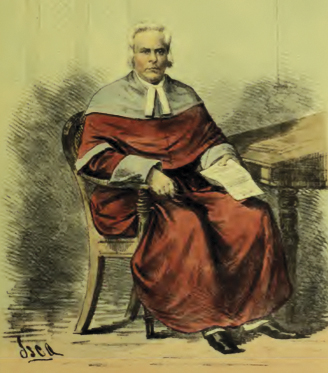Registered with the Registrar of Newspapers for India under R.N.I 53640/91
Vol. XXVII No. 14, November 1-15, 2017
CHARIVARI – 7
- Sriram V
The defender of the District Courts

The Hon’ble W. Holloway, Puisne Judge of the High Court of Madras, was a product of Haileybury College, that institution that turned out Civil Servants for employment in India. Arriving in India in 1849, Holloway was first stationed in Thanjavur and then, in 1853, became the Registrar of the Sudder Court. Thereafter he was -appointed to various judicial positions in Malabar. While there, he studied the local systems and practices assiduously, and became an expert on the customs of the region.
It was during this time that the functioning of the mofussil courts came in for a lot of criticism and Holloway, stung to the quick, wrote an elaborate defence of it. The work titled A Madras Civilian’s Defence of the Mofussil Courts of India, was kept under wraps. Holloway, -wanting to steal a march on his detractors, most notable of whom was John Bruce Norton, Bar-at-Law. The book was despatched by the mail packet from Madras, to be delivered in London via Southampton.But unknown to Holloway, Norton had already received a pirated copy and read the whole of it. Knowing full well that the mail despatch would be delayed, Norton wrote his rejoinder, A Reply to a Madras Civilian’s (Mr Holloway’s) Defence of the Mofussil Courts of India, in one night and had it sent to his brother GR Norton, via Marseilles. The result was, as GR Norton wrote in his preface, the rejoinder was ready in book form to greet Mr Holloway’s book on its arrival! Norton’s work is available as a free-for-download on the Internet and its conclusion a classic – Holloway, according to Norton, wrote -according to the creed “There is no service like the civil service and Holloway is its prophet.”
By the 1860s, Holloway was elevated to the Bench, making him the youngest civilian to become a Judge. He was also among the first batch of judges of the then newly formed High Court of Madras. Given his experience in the districts, Holloway developed an understanding of Indians in a way few others did. He keenly felt the necessity for Indians to have a greater say in the laws that governed them. When asked to recommend three names for appointment of a Judge at the Sudder Court, he wrote thrice the name of T Muthuswami Iyer, whom he admired greatly and who was then holding judicial office in the districts. The latter became the first Indian to be appointed Judge of the High Court of Madras in 1883, by when Holloway had long -retired. In fact, the Charivari (published in 1877) makes mention of his -impending departure to England. But Muthuswami Iyer and he -remained in touch.
It also notes that Holloway was a charming Whist player and full of social graces. It was perhaps this side of his personality that led to his being made the first President of the Cosmopolitan Club. But he had another aspect to him – on the Bench he was known to be brusque, though none could fault his judgements. He was also known to abhor the Press. Holloway’s Garden on Pantheon Road, Egmore, probably took its name from him. It was there that India’s first broadcasting service, by the Madras Presidency Radio Club, was begun in 1924. That property is now the Co-optex premises.


I was delighted to read this about my great great grandfather William Holloway, some of which I knew. Bity I had never seen any photograph or other image of him.